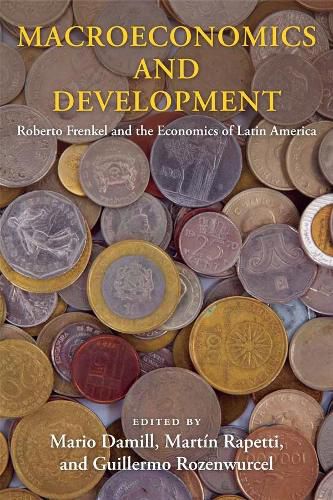Readings Newsletter
Become a Readings Member to make your shopping experience even easier.
Sign in or sign up for free!
You’re not far away from qualifying for FREE standard shipping within Australia
You’ve qualified for FREE standard shipping within Australia
The cart is loading…






Latin American neo-structuralism is a cutting-edge, regionally focused economic theory with broad implications for macroeconomics and development economics. Roberto Frenkel has spent five decades developing the theory’s core arguments and expanding their application throughout the discipline, revolutionizing our understanding of high inflation and hyperinflation, disinflation programs, and the behavior of foreign exchange markets as well as financial and currency crises in emerging economies.
The essays in this collection assess Latin American neo-structuralism’s theoretical contributions and viability as the world’s economies evolve. The authors discuss Frenkel’s work in relation to pricing decisions, inflation and stabilization policy, development and income distribution in Latin America, and macroeconomic policy for economic growth. An entire section focuses on finance and crisis, and the volume concludes with a neo-structuralist analysis of general aspects of economic development. For those seeking a comprehensive introduction to contemporary Latin American economic thought, this collection not only explicates the intricate work of one of its greatest practitioners but also demonstrates its impact on the growth of economics.
$9.00 standard shipping within Australia
FREE standard shipping within Australia for orders over $100.00
Express & International shipping calculated at checkout
Latin American neo-structuralism is a cutting-edge, regionally focused economic theory with broad implications for macroeconomics and development economics. Roberto Frenkel has spent five decades developing the theory’s core arguments and expanding their application throughout the discipline, revolutionizing our understanding of high inflation and hyperinflation, disinflation programs, and the behavior of foreign exchange markets as well as financial and currency crises in emerging economies.
The essays in this collection assess Latin American neo-structuralism’s theoretical contributions and viability as the world’s economies evolve. The authors discuss Frenkel’s work in relation to pricing decisions, inflation and stabilization policy, development and income distribution in Latin America, and macroeconomic policy for economic growth. An entire section focuses on finance and crisis, and the volume concludes with a neo-structuralist analysis of general aspects of economic development. For those seeking a comprehensive introduction to contemporary Latin American economic thought, this collection not only explicates the intricate work of one of its greatest practitioners but also demonstrates its impact on the growth of economics.